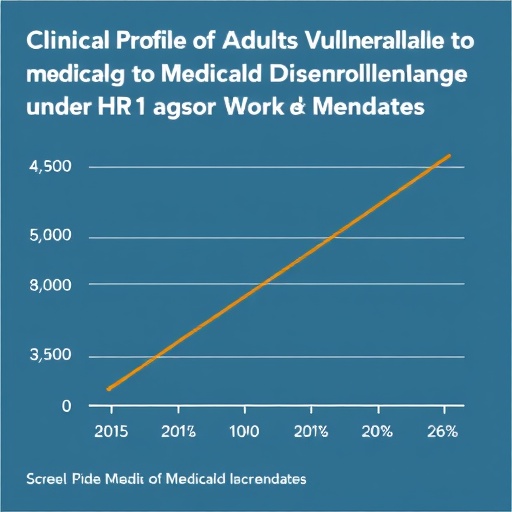A recent compelling study published in JAMA unveils the profound risks faced by approximately five million adults on Medicaid amid potential disenrollment triggered by HR 1’s work requirements. This legislation mandates that recipients engage in employment or community service to maintain eligibility, a policy shift fraught with intricate implications for public health, economics, and social welfare systems. The findings focus particularly on adults aged 50 to 64, a demographic characterized by a disproportionally high burden of chronic illnesses and function-limiting conditions, underscoring the silent crises potentially emerging from sweeping administrative changes.
The research meticulously examines how HR 1 affects Medicaid recipients, a vulnerable population whose health status is intricately woven with their access to medical coverage. Middle-aged adults often face cumulative health challenges such as diabetes, hypertension, cardiovascular disease, and musculoskeletal disorders—conditions that can severely inhibit their ability to fulfill work requirements. This intersection of health and policy not only threatens their insurance status but also portends broader societal costs, including increased emergency healthcare utilization and deterioration of overall community well-being.
Underlying the study is a critical analysis of the policy’s structural design, which hinges on the premise that employment is both feasible and beneficial for all able-bodied adults. However, this research highlights that for many in the 50-64 age bracket, chronic disease prevalence creates substantial barriers to sustained employment. The potentially punitive nature of disenrollment risks disenfranchising those most in need of continued medical support, paradoxically increasing systemic healthcare expenditures due to untreated or poorly managed illnesses progressing to acute episodes.
From a methodological perspective, the investigators utilized robust epidemiological data combined with health insurance analytics to project disenrollment estimates and correlate these with known disease prevalence rates. This approach provides a quantitative foundation to gauge the real-world impacts of policy decisions, allowing stakeholders to anticipate the downstream effects on morbidity patterns and economic stability within this fragile population subset. The study’s rigor is further emphasized through comprehensive control for confounding variables such as socioeconomic status, regional healthcare access, and demographic diversity.
The implications of this work extend beyond the immediate Medicaid context, touching on broader themes of health equity and social determinants of health. The challenges illustrated by this policy application reflect enduring systemic inequities that disproportionately affect older, lower-income adults. As these groups face compounded socioeconomic and health barriers, public health interventions must be tailored to address not only individual health status but also the policy landscapes controlling healthcare access and support.
Moreover, the research critically points to the risk of unintended consequences associated with policies that do not adequately account for health-related limitations. Stricter work requirements might inadvertently escalate rates of disenrollment, directly diminishing coverage for individuals who are simultaneously most susceptible to disease exacerbations. Consequently, this could precipitate cascading effects such as increased hospital admissions, heightened mortality rates, and amplified economic hardship, both personal and systemic.
Interdisciplinary insight from economics and social sciences is essential to contextualize this study’s findings. Health insurance frameworks must balance financial stewardship with empathetic, data-driven policies that prioritize patient outcomes. The work requirement model reflects a paradigm that may undervalue chronic illness’s impact on employability and personal agency. As such, recalibrating Medicaid eligibility criteria could mitigate the risk of coverage loss while supporting a more nuanced understanding of the interplay between health, labor capacity, and social support systems.
Notably, the study also brings attention to the wider demographic challenges within the Medicaid population. The age group of 50 to 64 is increasingly significant as it bridges working-age adults and those approaching Medicare eligibility. Ensuring continuity of care during this transition period is vital to prevent severe health decline and reduce the need for emergency services. This research advocates for policies that consider the longitudinal health trajectories of these individuals, emphasizing preventive care and chronic disease management rather than exclusion through bureaucratic requirements.
The ethical considerations posed by this research cannot be overstated. Forcing medically vulnerable individuals to meet employment mandates under threat of losing essential health coverage raises critical questions about justice, human rights, and public welfare priorities. Policymakers must engage with such data to craft regulations that protect the most at-risk populations while fostering pathways to economic participation aligned with individual capacity and societal support mechanisms.
Furthermore, this investigation accentuates the need for transparent communication and accessible information dissemination. Healthcare providers, social workers, and Medicaid recipients require clear guidance to navigate complex eligibility landscapes, minimizing confusion and potential disenrollment due to procedural noncompliance rather than genuine ineligibility. Enhanced outreach and assistance programs, informed by studies like this, can bridge the gap between policy intentions and real-world outcomes.
In conclusion, the study published in JAMA highlights the critical consequences of HR 1’s Medicaid work requirements on a vulnerable middle-aged population burdened with chronic diseases. It underscores the urgent need for evidence-based policy revisions that prioritize health outcomes over rigid administrative controls. With five million adults potentially facing disenrollment, the intersection of health insurance, chronic illness, and socioeconomic factors demands a thoughtful, humane approach to Medicaid eligibility that safeguards both individual and public health on a large scale.
Contact for further inquiry or to gain access to this groundbreaking research is available through the corresponding author, Ashwin K. Chetty, reachable at ashwin.chetty@yale.edu. Media representatives and policymakers are encouraged to utilize this study’s insights to inform ongoing debates about Medicaid’s future and the foundational role of healthcare access in maintaining societal well-being.
Subject of Research: Medicaid disenrollment risks resulting from HR 1’s work requirements, focusing on chronic disease prevalence in adults aged 50 to 64.
Article Title: Not specified in the provided content.
News Publication Date: Not specified in the provided content.
Web References: Not provided.
References: (doi:10.1001/jama.2025.16533)
Image Credits: Not applicable.
Keywords: Health insurance, Risk factors, Adults, Age groups, Older adults, Human resources




